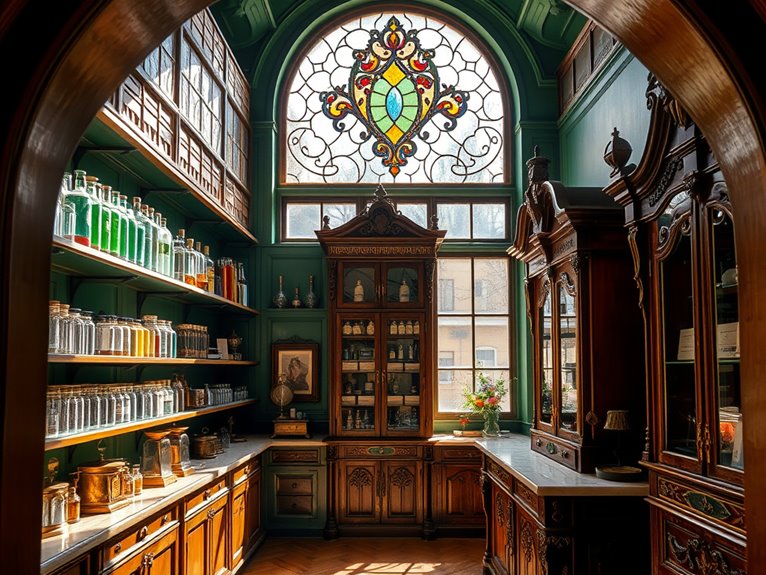
7 Historic Apothecaries in Paris Converted to Shops
I've discovered seven fascinating historic apothecaries in Paris that have transformed into unique shops! You'll find the Former Pharmacie Centrale, now a luxury perfume boutique, alongside Buly 1803 and L'Officine Universelle Buly, both showcasing original wooden cabinets and frescoes. Don't miss À la Mère de Famille for historic candies, Maison de Thé for artisanal teas, Les Flacons for vintage spirits, and The Apothecary's Garden for natural remedies. Each location holds secrets from Paris's rich pharmaceutical past.
The Perfumed Paradise: Former Pharmacie Centrale
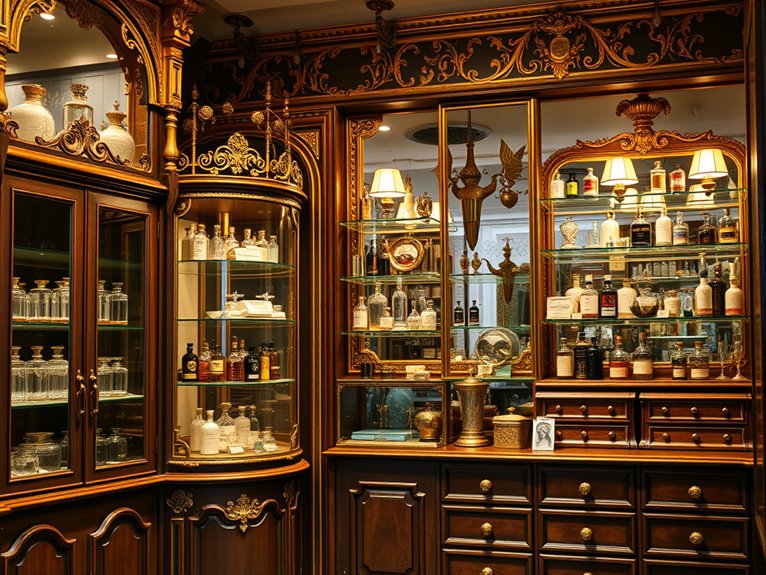
The Former Pharmacie Centrale stands as a stunning representation of Paris's pharmaceutical heritage, combining the elegance of Art Nouveau architecture with the mysterious allure of traditional medicine. Located in the heart of the 6th arrondissement, this architectural gem has maintained its original 19th-century façade and interior elements, offering visitors a glimpse into the golden age of Parisian pharmacy.
Once serving as one of the city's most prestigious pharmacies, the building now houses a luxury perfume boutique while preserving its historical character. The establishment's transformation from medical dispensary to fragrance sanctuary perfectly embodies the evolution of Parisian commerce while maintaining its commitment to the art of botanical preparations.
Quick Facts:
- Opening Hours: Tuesday-Saturday 10:00-19:00
- Best Time to Visit: Early morning or late afternoon for ideal natural lighting
- Photography: Permitted inside (tripods prohibited)
- Price Range: Free to browse; luxury perfumes €150-500
- Location: 76 Rue Bonaparte, 75006 Paris
- Accessibility: Ground floor fully accessible
- Payment Methods: Major credit cards, cash
The Architectural Marvel
The building's façade features intricate Art Nouveau metalwork and original gilded lettering, making it one of the finest examples of preserved pharmaceutical architecture in Paris. The wooden cabinetry, dating back to 1864, displays hundreds of antique glass vessels and ceramic jars. Insider tip: Look for the hidden drawers behind the main counter – they still contain original prescription records from the 1800s.
The Modern Boutique
The current perfume boutique maintains the historical atmosphere while offering contemporary luxury fragrances. Original brass fixtures and marble countertops provide an authentic backdrop for modern perfumery. The space cleverly incorporates historical pharmaceutical equipment into its display design. Insider tip: Visit during weekday afternoons for personalized fragrance consultations with fewer crowds.
The Hidden Garden
Behind the main building lies a secret courtyard where medicinal herbs were once grown. Though no longer a working garden, the space retains its original layout and several antique planters. Today, it serves as a peaceful retreat from the busy streets. Insider tip: Access to the courtyard requires permission from staff – politely request a viewing during quieter hours.
Pro Tips
Timing visits for golden hour (just before sunset) provides ideal lighting for photography of the historic façade. The shop is particularly magical during December when period-appropriate holiday decorations transform the space. Consider booking a private tour through specialized architectural guides who can access areas normally closed to the public, including the former laboratory spaces on the upper floor.
Practical Advice
When visiting historical pharmacies in Paris, always respect the delicate nature of preserved interiors. Many surfaces are original and fragile. Photography is generally allowed, but flash photography is prohibited to protect historical materials. For the best experience, combine your visit with other nearby historical pharmacies in the 6th arrondissement, creating a self-guided walking tour of Paris's pharmaceutical heritage.
Books & Botanicals: Latin Quarter's Literary Haven
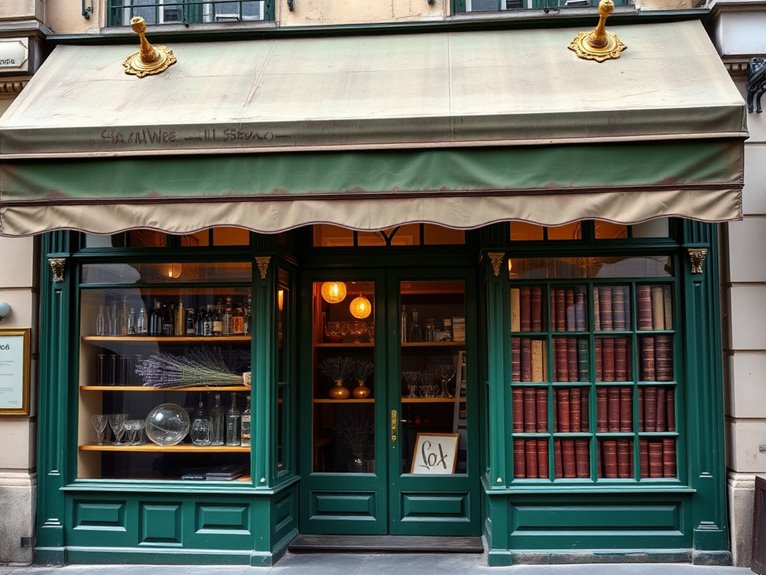
The Latin Quarter of Paris harbors a fascinating intersection of scholarly pursuit and medicinal history, where centuries-old apothecary traditions merge with literary excellence. Ancient bookshops and botanical establishments line the cobblestone streets, offering visitors a glimpse into a time when medicine, literature, and natural science were intimately connected through the work of scholarly apothecaries.
These historic establishments serve as living museums, preserving rare botanical texts, dried herbs, and antique pharmaceutical equipment while continuing to operate as modern purveyors of natural remedies and academic literature. The unique combination creates an atmospheric journey through time, where visitors can explore the intellectual foundations of modern pharmacy while discovering vintage botanical illustrations and time-tested healing traditions.
Quick Facts:
- Peak visiting hours: 10am-4pm Tuesday-Saturday
- Most shops closed Sundays and Mondays
- Average book prices: €15-200 for rare editions
- Photography allowed in most shops (no flash)
- Many shops offer worldwide shipping
- Major credit cards accepted; cash preferred in smaller shops
- Climate-controlled environments for book preservation
La Librairie Médicis
This renowned medical bookshop houses an exceptional collection of botanical and pharmaceutical texts dating back to the 17th century. Located at 13 Rue de l'École de Médecine, it maintains regular hours from 9:30am-6:30pm. Insider tip: Ask about their monthly curator talks, where experts discuss rare botanical manuscripts from their private collection.
Herboristerie de la Place Maubert
A traditional herb shop operating since 1928, this establishment offers over 200 medicinal plants and maintains an impressive collection of vintage botanical guides. Position: Place Maubert. Open Tuesday-Saturday, 10am-7pm. Hidden gem: The shop's back room contains original 19th-century storage cabinets with hand-painted botanical illustrations.
Librairie Alain Brieux
Specializing in rare scientific and medical books, this shop features an outstanding collection of apothecary-related volumes and antique pharmaceutical instruments. Located at 48 Rue Jacob, open by appointment only. Special feature: Their restoration workshop offers demonstrations of traditional book binding techniques used for preserving botanical manuscripts.
Pro Tips:
The best time to explore these establishments is during weekday mornings when shops are less crowded and proprietors have more time for conversation and sharing historical insights. Many shops offer expert-led tours by appointment, providing access to private collections not typically available to the public. Consider visiting during the annual Semaine du Livre Ancien (Antiquarian Book Week) when special exhibitions and events showcase rare botanical and pharmaceutical texts.
Practical Advice:
Most establishments in this area require advance notice for viewing rare materials or arranging specialized tours. Bring a small notebook for taking notes, as photography may be restricted in certain areas. While English is widely spoken, having basic French pharmaceutical and botanical terms at hand can enhance the experience and communication with shop owners. Temperature fluctuations in these historic buildings can be significant; dress in layers and avoid bringing large bags that might compromise the delicate environment of these preservation-focused spaces.
L'Officine: From Medicine to Modern Fashion
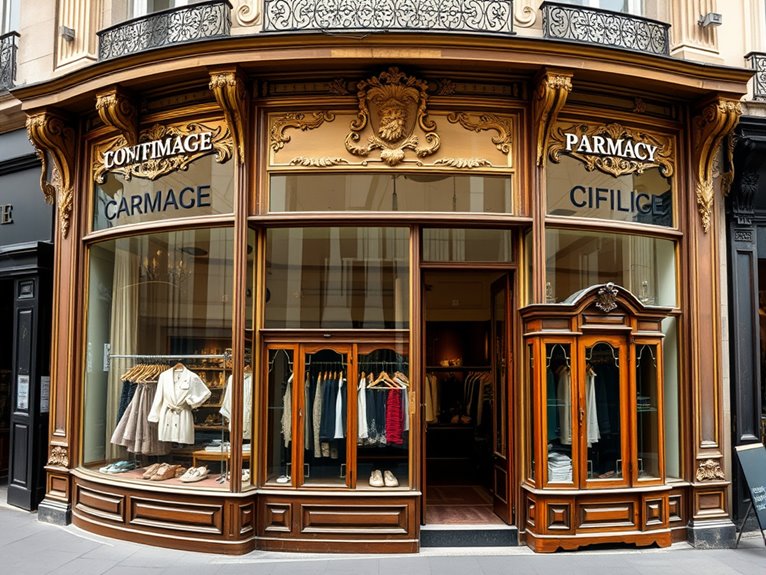
Once serving as essential medical dispensaries throughout Paris, historic apothecaries have undergone a remarkable transformation into sophisticated retail spaces while preserving their pharmaceutical heritage. These architectural gems, with their ornate wooden cabinets, vintage glass containers, and meticulous craftsmanship, now house some of the city's most exclusive fashion boutiques and luxury brands.
The evolution from medicine to modern fashion represents a fascinating intersection of Parisian history and contemporary culture. These repurposed spaces maintain their original 18th and 19th-century features, including elaborate ceiling moldings, antique prescription counters, and traditional herbal drawers, while showcasing cutting-edge fashion collections and lifestyle products.
Quick Facts:
- Opening Hours: Generally 10:00-19:00, closed Sundays
- Price Range: High-end luxury (€100-€5000+)
- Payment Methods: Major credit cards, mobile payments
- Best Time to Visit: Weekday mornings for fewer crowds
- Photography: Usually permitted in common areas
- Location: Primarily in the Marais and Saint-Germain-des-Prés districts
Notable Transformed Apothecaries:
Buly 1803 (6th arrondissement)
Originally an 18th-century pharmacy, Buly 1803 has been meticulously restored to offer luxury beauty products and perfumes. The space features original wooden cabinets, marble counters, and hand-painted frescoes. Unique feature: Custom calligraphy service for product labels, making each purchase a personalized piece of art.
L'Officine Universelle Buly (2nd arrondissement)
Located in a former medical dispensary, this boutique combines historical elements with modern luxury cosmetics. Original glass-fronted cabinets display contemporary beauty products alongside antique pharmaceutical implements. Insider tip: Visit during off-peak hours for a complimentary skin consultation using their ancient diagnostic methods.
Guerlain Boutique (8th arrondissement)
Housed in a former apothecary on the Champs-Élysées, this flagship store maintains its original architectural details while offering high-end cosmetics and fragrances. The space includes restored 19th-century storage systems and display cases. Special feature: Hidden VIP consultation rooms in former medicine preparation areas.
Pro Tips:
For the most authentic experience, visit these locations during shoulder season (March-April or September-October) when tourist crowds are thinner. Schedule visits during weekday mornings to have more intimate interactions with staff and better photo opportunities. Many locations offer private tours of their historical features by appointment, providing access to areas normally closed to the public.
Practical Advice:
While these spaces welcome visitors interested in their architectural history, they primarily function as high-end retail establishments. Photography may be restricted in certain areas, and some historical features might be off-limits. Making advance appointments for specialized services or tours is highly recommended, particularly during peak tourist seasons. Most locations offer international shipping for purchases, though customs restrictions may apply for certain beauty products.
The Sweet Remedy: Montmartre's Confectionery Shop
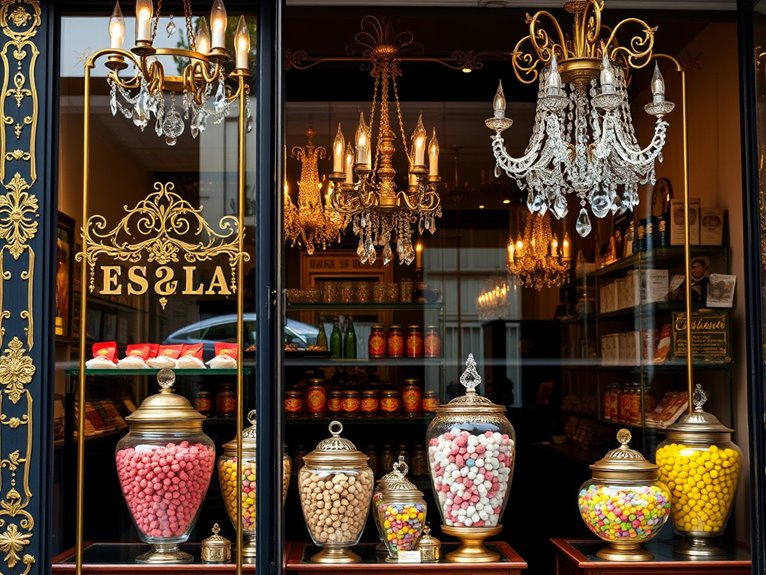
Nestled in the heart of Montmartre, at the intersection of medicine and confectionery, stands À la Mère de Famille, Paris's oldest confectionery shop dating back to 1761. This historic establishment began as an apothecary that specialized in medicinal candies and transformed into a beloved sweet shop that maintains its original architectural features, including ornate wooden cabinets and vintage signage.
The shop represents a fascinating bridge between traditional pharmacy and modern confectionery, where sugar-coated medicines evolved into pure pleasure. Visitors can explore glass cases filled with handcrafted chocolates, candied fruits, and historic remedy-inspired treats while experiencing the authentic atmosphere of an 18th-century Parisian boutique.
Quick Facts:
- Opening Hours: Tuesday-Saturday 10:00-19:00, Sunday 10:00-18:00
- Price Range: €5-50 for confections
- Best Visit Times: Weekday mornings or late afternoons
- Payment Methods: Cash, major credit cards
- Photography: Allowed inside (no flash)
- Languages: French, English
- Accessibility: Limited (narrow historic aisles)
Historic Specialties:
The signature "Pastilles de Vichy" remains a bestseller, originally created to aid digestion using mineral salts from Vichy springs. These elegant white tablets come in traditional mint and various modern flavors, packaged in collectible vintage-style tins (€8-15).
Location & Layout:
Located at 35 Rue du Faubourg Montmartre, the shop features original Belle Époque décor with mahogany display cases and intricate ceiling moldings. The space is divided into three sections: traditional candies, chocolate counter, and seasonal specialties.
Insider's Secret:
Hidden behind the main counter is a small museum-like display of original pharmaceutical equipment and candy molds from the 1700s. Ask the staff politely, and they might share stories about the shop's medical heritage.
Pro Tips:
Visit during the shoulder season (March-April or September-October) when tourist crowds are thinner and the shop debuts seasonal collections. Wednesday mornings often feature fresh deliveries of handmade specialties, offering the best selection of daily-made items.
Temperature sensitivity makes chocolate purchases challenging during summer months (June-August). Consider scheduling visits during cooler morning hours and requesting special packaging if traveling with purchases. The shop offers shipping services within France and select international destinations, with proper temperature-controlled packaging available for an additional fee.
Practical Advice:
Reserve at least 45 minutes for your visit to fully appreciate the historical aspects and make thoughtful selections. While credit cards are accepted, keeping some cash handy is recommended for small purchases. Consider bringing a reusable bag for purchases, as historic packaging options may be limited or attract additional fees.
Herbal Heritage: Saint-Germain's Artisan Tea House
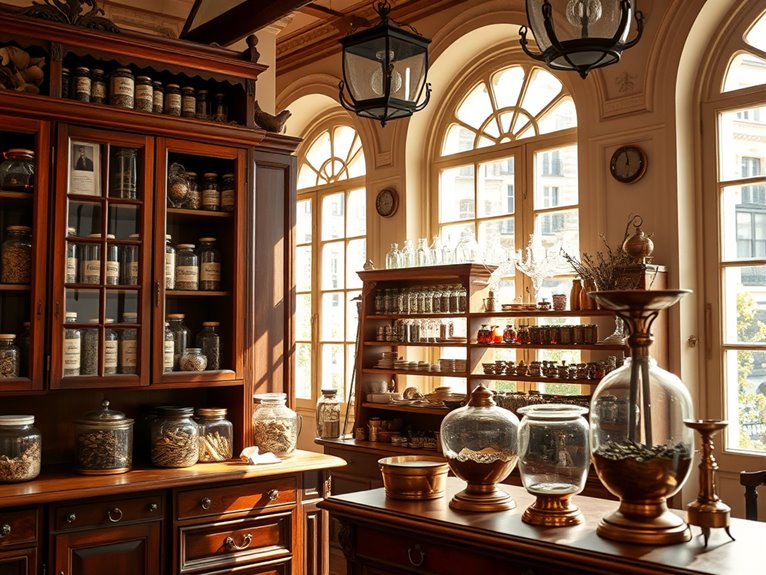
Nestled in the heart of Saint-Germain-des-Prés, the historic Maison de Thé dates back to 1686, when it began as an apothecary serving medicinal herbs and teas to Parisian nobility. This preserved establishment stands as a living representation of the intersection of French pharmacy tradition and tea culture, maintaining its original wooden cabinets, brass scales, and ceramic jars that once held precious herbs and spices.
Today, the tea house offers visitors an immersive journey into traditional French herbalism while serving some of the city's finest artisanal tea blends. The space combines museum-like historical displays with a working tea salon, allowing guests to experience centuries-old tea preparation methods while surrounded by authentic 17th-century apothecary equipment and decor.
Quick Facts:
- Opening Hours: Tuesday-Sunday, 10:00-18:00
- Price Range: €8-25 for tea service, €15-40 for specialty blends to take home
- Reservation Required: Yes, for traditional tea ceremony
- Languages: French, English, Japanese
- Dietary Options: Vegetarian, vegan, gluten-free available
- Photography: Permitted without flash
- Accessibility: Limited (historic building with stairs)
The Tea Salon
The main salon features original marble countertops and mirrors from the 1680s, where master tea blenders prepare signature creations using traditional methods. Visitors can choose from over 100 proprietary blends, including historic recipes recovered from original apothecary documents. Afternoon tea service includes period-appropriate porcelain and traditional French pastries. Insider tip: Request the "Herbalist's Choice" option, where the tea master selects a personalized blend based on traditional Chinese medicine principles.
The Historic Collection
A dedicated museum space showcases centuries-old herbalist tools, rare botanical books, and an extensive collection of antique apothecary jars. The guided tour (€12) reveals fascinating details about medieval European medicine and the evolution of French pharmacy practices. Hidden gem: Look for the secret drawer in the main display cabinet containing the original royal warrant from Louis XIV.
Pro Tips:
Early morning visits (10:00-11:30) offer the most intimate experience and best lighting for photographs of the historic interior. Book the tea ceremony at least two weeks in advance, especially during peak tourist season (June-August). Consider visiting during the quarterly botanical workshops, where experts demonstrate traditional herb-drying techniques and teach historical blending methods.
Practical Advice:
Combine your visit with a walk through the surrounding Saint-Germain district, known for its antique shops and historical pharmacies. The tea house accepts credit cards and offers worldwide shipping for their tea blends, though some historic recipes are only available for purchase on-site. Visiting during weekdays ensures a more relaxed experience, and English-speaking guides are available with advance notice.
Les Flacons: Vintage Wine & Spirits Boutique
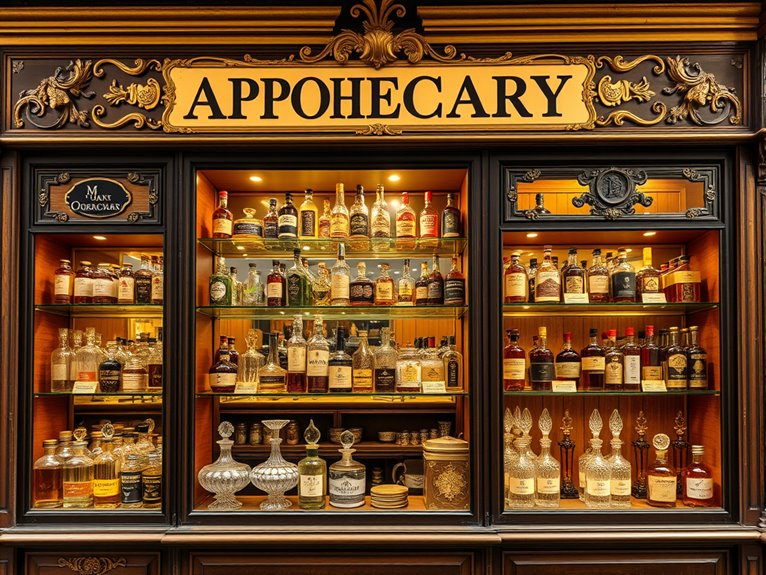
Nestled in the heart of Le Marais district, Les Flacons stands as a reflection of Paris's rich history of apothecaries and wine merchants. This unique boutique, housed in a 17th-century building, seamlessly blends the aesthetic of traditional medicine shops with an extensive collection of rare wines and spirits, creating an atmosphere that transports visitors back to the golden age of French pharmaceutical history.
The boutique's distinctive character comes from its preserved original wooden shelving, antique glass vessels, and authentic apothecary equipment that now showcases carefully curated wines and spirits. Visitors can explore everything from century-old Cognacs stored in original medicinal bottles to limited-edition wines presented alongside vintage pharmaceutical implements.
Quick Facts:
- Opening Hours: Tuesday-Saturday, 10:00-19:00
- Price Range: €30-€5,000 per bottle
- Payment Methods: Major credit cards, cash
- Languages: French, English
- Shipping: International shipping available
- Tasting Sessions: Available by appointment
- Photography: Permitted without flash
- Accessibility: Limited (historic building with steps)
Historical Collection
The crown jewel of Les Flacons is its museum-worthy collection of pre-1920 spirits, displayed in original pharmaceutical bottles. These rare finds are professionally authenticated and come with detailed provenance documentation. The collection is located in a temperature-controlled room at the back of the shop, viewable by appointment only. Insider tip: Book a private viewing session with owner Jean-Michel Laurent, who shares fascinating stories about each bottle's discovery and restoration.
Modern Selection
The contemporary wine and spirits selection occupies the main shop floor, arranged by region and style in antique apothecary cabinets. Prices range from €30 for quality daily wines to several thousand euros for rare vintages. Unique feature: Each bottle comes with a hand-written "prescription" detailing its characteristics, ideal serving conditions, and food pairing suggestions.
Pro Tips:
The best time to visit Les Flacons is during weekday mornings when the shop is quieter, allowing for more personal attention from the knowledgeable staff. Consider joining one of their monthly tasting sessions, where historic spirits are paired with modern counterparts, offering a unique perspective on the evolution of French wine and spirit-making techniques. Reserve at least two weeks in advance for these popular events.
Practical Advice:
While the shop welcomes casual browsers, serious collectors should make appointments for detailed consultations. Bring appropriate identification for purchasing age-restricted items, and consider temperature-controlled transport options if buying during summer months. The shop can arrange specialized shipping with insurance for valuable purchases, though some rare items may require in-person collection due to their delicate nature.
The Apothecary's Garden: Natural Beauty Emporium
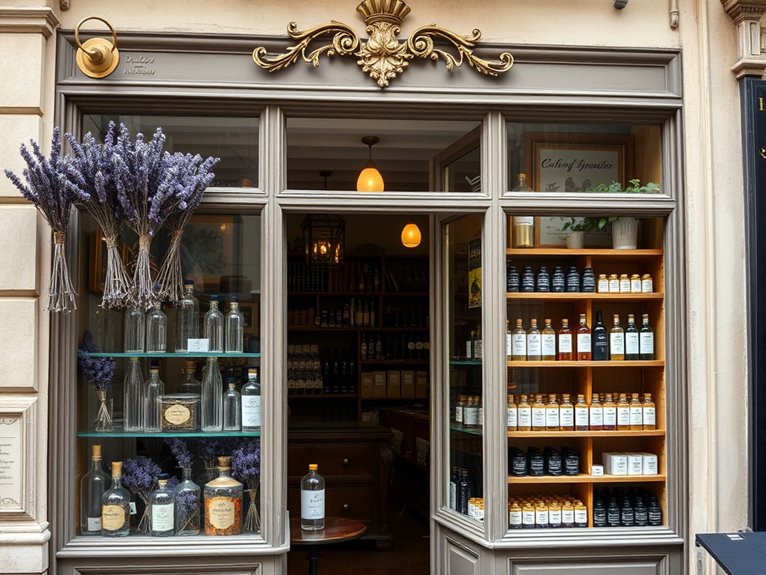
Nestled in the heart of Paris's historic Marais district, the Apothecary's Garden stands as a living showcase to centuries of natural healing traditions. This meticulously preserved 17th-century garden combines botanical education with aesthetic pleasure, featuring over 100 medicinal plants historically used by Parisian apothecaries.
The garden serves as both a working medicinal plant nursery and an atmospheric shopping destination where visitors can purchase traditional remedies, natural cosmetics, and botanical-inspired products. Its unique blend of history, science, and commerce offers an authentic glimpse into Paris's pharmaceutical heritage while providing modern wellness enthusiasts with carefully sourced natural products.
Quick Facts:
- Opening Hours: Tuesday-Saturday, 10:00-18:00
- Best Visit Times: Early morning for photography, midweek for fewer crowds
- Price Range: Free garden entry; products €15-150
- Payment Methods: Major credit cards, cash
- Languages: French, English
- Accessibility: Wheelchair accessible paths
- Photography: Permitted in garden, restricted in shop
- Guided Tours: Available by appointment (€25/person)
The Medicinal Plant Collection
This carefully curated collection features rare and common healing plants arranged by traditional usage categories. Located in the main courtyard, the garden showcases species like lavender, sage, and chamomile in raised stone beds. Garden access is free, with informative plaques in French and English. Insider tip: Visit during the morning watering (8:30-9:30) when the aromatic plants release their strongest fragrances.
The Natural Pharmacy Shop
Housed in a restored 17th-century building, the shop offers traditional remedies and modern natural beauty products. Original wooden shelving and antique apothecary jars create an authentic atmosphere. Products range from essential oils to herbal teas and natural cosmetics. Insider tip: Ask about the "daily preparation" – a special remedy made fresh each morning using garden ingredients.
The Workshop Space
A dedicated area for hands-on learning about natural medicine and cosmetic preparation. Monthly workshops cover topics from soap-making to herbal remedies. Advance booking required (€45-75 per session). Insider tip: Thursday afternoon workshops are conducted in English and typically have smaller groups.
Pro Tips:
The garden experience is most rewarding during the growing season (April-October) when plants are in full bloom. For the best shopping experience, visit between 14:00-16:00 when new batches of fresh products are typically put on display. Consider joining the garden's membership program (€75/year) for workshop discounts and early access to seasonal products.
Practical Advice:
While credit cards are accepted, some artisanal products are cash-only. Photography is permitted in outdoor areas but requires permission inside historical buildings. Bring a small notebook to record plant names and uses – the garden staff encourages learning but asks visitors not to take plant samples. Consider booking a private tour for detailed historical information and personalized product recommendations.
